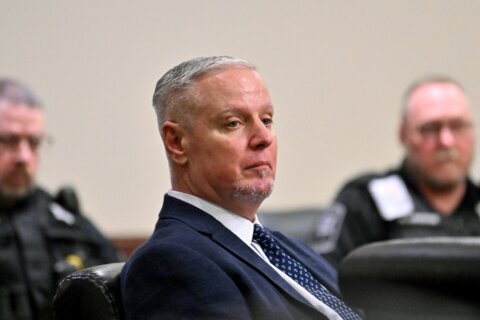This article was republished with permission from WTOP’s news partner InsideNoVa.com. Sign up for InsideNoVa.com’s free email subscription today.
Manassas City Public Schools has begun implementing its “All In Virginia” plan as part of the statewide funding initiative to address learning gaps.
Ed Stephenson, director of instruction with the school division, presented the spending plan to the Manassas City School Board during a December meeting. In November, the Virginia Department of Education approved the Manassas City Public Schools plan for addressing student learning loss and literacy, part of the “All In Virginia” program launched by Gov. Glenn Youngkin.
The program aims to support students experiencing the negative lingering effects of COVID-19 and includes assistance for implementing the Virginia Literacy Act.
“I do want to note that while these kinds of programs are not new to our school division, the All In recommendations have helped us to stand up individual school programs outside of school hours to target learning gaps,” Stephenson said.
The school division has until the end of the 2025-26 school year to spend the funds, according to Stephenson. The division plans to use the money over the course of fiscal 2025 and 2026.
The governor provided recommendations via the All In Virginia plan as to how the funds should be allocated. Some of the recommendations include:
-
18-36 weeks of academic support in grades 3-8 for 3-5 hours a week
-
Use of grade-level tools and materials
-
Delivery of instructional support in real time by trained staff
-
Regular progress monitoring
-
Personalization to meet student needs
The governor also recommended divisions allocate 70% of funds for the All In plan and 20% for implementing the Virginia Literacy Act.
The Manassas school division’s plan follows that 70/20 recommendation. In addition, the plan meets the governor’s recommendations by using a targeted support block in grades K-8. The program:
-
Runs all year
-
Provides three hours a week of support in grades K-6 and five hours a week in grades 7-8
-
Uses grade-level materials and platforms
-
Features live instruction delivered by certified teachers and trained staff
-
Uses A Cycle that Works programming and supplemental tools for progress monitoring
The school division is also providing academic support outside of school hours for 1-3 hours a week to supplement school-day targeted instruction. Students have been identified for the services based on academic need and invited to participate, according to Stephenson.
Support for the programs is provided mostly by teachers and utilizes platforms that allow for personalization of the experience to meet specific student needs.
The before- and after-school programs serve around 500 students at the elementary, intermediate and middle school level district-wide, Stephenson said.
Timeline, oversight
The programs began as early as October in some schools, though Stephenson said most did not begin until November.
Officials said the school division’s targeted support program that was already implemented in 2022-23 aligns with key aspects of the governor’s plan, including on number of weeks, hours per week, tools and resources, staff qualifications and assessment and progress-monitoring processes.
“So while the basic framework we established last year for the targeted support program remains the same, the implementation has been enhanced and adjusted based on the resources the state has provided,” Stephenson said.
The school division is preparing personnel for implementation of the Virginia Literacy Act in 2024-25, according to Stephenson. That will include core resource adoption and training, professional learning for core literacy programs, Virginia Literacy Act-mandated strategies and screening and diagnostic tools, and individual reading plans.
Regarding the Virginia Literacy Act, Stephenson said the school division is preparing a core literacy resource recommendation for presentation to the School Board in January.
Local professional learning around the division’s adopted program will be rolled out to teachers during the second semester. State-level training on practices, screening and diagnostic tools with reading support teachers is underway and will be expanded to other teachers later in the school year.
While there are no state reporting requirements attached to the funds, the school division uses “valid and reliable data sources to include common formative and benchmark assessments, diagnostic tests, inventories and platform-based progress monitoring tools to regularly evaluate the effectiveness of the programs these funds support,” Stephenson said.
Vice Chair Lisa Stevens said because there are no state reporting requirements, the state is simply “providing the program” while the school division has the oversight on the implementation of the program.






